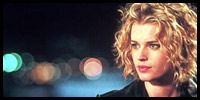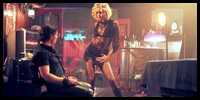
 |
Femme Fatale (2002) Directed by Brian De Palma Cast: Rebecca Romijn-Stamos, Antonio Banderas, Peter Coyote, Eriq Ebouany, Gregg Henry, Rie Rasmussen, Edouard Montoute, Thierry Fremont, Regis Wargnier 2002 – 112 minutes Rated: Reviewed by Dustin Putman, November 9, 2002.  Brian De Palma, once the brilliantly innovative master of the modern Hitchcockian thriller genre (1976's "Obsession," 1980's "Dressed to Kill," 1981's "Blow Out"), has stumbled in recent years with a string of ambitious failures (1998's "Snake Eyes," 2000's "Mission to Mars"). His latest picture, "Femme Fatale," a welcome return to the style and plotting of his earlier work, is not quite on the same level. Preposterous, labyrinthine, and aesthetically superb, with a sly nod to David Lynch (2001's "Mulholland Drive") dropped into the mix, "Femme Fatale" has its share of problems, but remains superior to anything De Palma has made in at least ten years.
Brian De Palma, once the brilliantly innovative master of the modern Hitchcockian thriller genre (1976's "Obsession," 1980's "Dressed to Kill," 1981's "Blow Out"), has stumbled in recent years with a string of ambitious failures (1998's "Snake Eyes," 2000's "Mission to Mars"). His latest picture, "Femme Fatale," a welcome return to the style and plotting of his earlier work, is not quite on the same level. Preposterous, labyrinthine, and aesthetically superb, with a sly nod to David Lynch (2001's "Mulholland Drive") dropped into the mix, "Femme Fatale" has its share of problems, but remains superior to anything De Palma has made in at least ten years.
 As the film opens, Laure Ash (Rebecca Romijn-Stamos) watches Barbara Stanwyck—perhaps cinematic history's greatest femme fatale—in 1944's "Double Indemnity," as she lies nude on her bed in a Paris hotel. Before long, Laure and her jewel thief partners have made their way into the 2001 Cannes Film Festival, where they slyly switch an actress' diamond outfit with one made of glass. Laure double-crosses her comrades, escaping with the jewels by herself.
As the film opens, Laure Ash (Rebecca Romijn-Stamos) watches Barbara Stanwyck—perhaps cinematic history's greatest femme fatale—in 1944's "Double Indemnity," as she lies nude on her bed in a Paris hotel. Before long, Laure and her jewel thief partners have made their way into the 2001 Cannes Film Festival, where they slyly switch an actress' diamond outfit with one made of glass. Laure double-crosses her comrades, escaping with the jewels by herself.
 Hiding out in a church, she is mistaken for a missing woman, Lily, whose child has just recently been killed. Taking Lily's identity, and becoming the wife of American ambassador Bruce Hewitt Watts (Peter Coyote) seven years later, Laure finds herself involved with paparazzo-with-a-conscience Nicolas Bardo (Antonio Banderas), who has sold her pictures to the tabloids. Meanwhile, Laure's former partners are released from prison and begin their vengeance-filled hunt for her.
Hiding out in a church, she is mistaken for a missing woman, Lily, whose child has just recently been killed. Taking Lily's identity, and becoming the wife of American ambassador Bruce Hewitt Watts (Peter Coyote) seven years later, Laure finds herself involved with paparazzo-with-a-conscience Nicolas Bardo (Antonio Banderas), who has sold her pictures to the tabloids. Meanwhile, Laure's former partners are released from prison and begin their vengeance-filled hunt for her.
 With more zany, borderline-incomprehensible twists and turns in any movie since "Mulholland Drive," "Femme Fatale" is far from a comedy, yet too silly to be taken with utmost seriousness. As a study in film noir style and the skewering of the genre's conventions, director Brian De Palma has crafted an elaborately dazzling masterpiece. Using long, unbroken shots, slow-motion, and his famous split-screen technique, "Femme Fatale" is one of the more original, visually striking films of the year. De Palma knows how to ratchet up suspense and foreboding, and he successfully does it here through images rather than dialogue (twenty-minute sections courageously go by without an uttered syllable).
With more zany, borderline-incomprehensible twists and turns in any movie since "Mulholland Drive," "Femme Fatale" is far from a comedy, yet too silly to be taken with utmost seriousness. As a study in film noir style and the skewering of the genre's conventions, director Brian De Palma has crafted an elaborately dazzling masterpiece. Using long, unbroken shots, slow-motion, and his famous split-screen technique, "Femme Fatale" is one of the more original, visually striking films of the year. De Palma knows how to ratchet up suspense and foreboding, and he successfully does it here through images rather than dialogue (twenty-minute sections courageously go by without an uttered syllable).
 Where "Femme Fatale" fails to pay off is in its plot, which is astute but empty. The characters and their usually conniving actions are obvious pawns in De Palma's master plan, rather than believable individuals. No reason is given for why Laure is such a bad seed; she just is, and willingly admits it. Because there is no one to latch onto and put a driving interest in their fate, the viewer is left only to admire the film's technical expertise. De Palma, cinematographer Thierry Arbogast (2001's "Kiss of the Dragon"), production designer Anne Pritchard (1997's "Affliction"), and editor Bill Pankow (1998's "Snake Eyes") have outdone themselves, joining together to concoct a joy for the eyes. The ineradicable music score by Ryuichi Sakamoto is also top-notch, helping to keep things moving at a taut pace.
Where "Femme Fatale" fails to pay off is in its plot, which is astute but empty. The characters and their usually conniving actions are obvious pawns in De Palma's master plan, rather than believable individuals. No reason is given for why Laure is such a bad seed; she just is, and willingly admits it. Because there is no one to latch onto and put a driving interest in their fate, the viewer is left only to admire the film's technical expertise. De Palma, cinematographer Thierry Arbogast (2001's "Kiss of the Dragon"), production designer Anne Pritchard (1997's "Affliction"), and editor Bill Pankow (1998's "Snake Eyes") have outdone themselves, joining together to concoct a joy for the eyes. The ineradicable music score by Ryuichi Sakamoto is also top-notch, helping to keep things moving at a taut pace.
The casting of Rebecca Romijn-Stamos (2002's "Rollerball"), a luscious but unconventional choice for the lead role of Laure Ash, pays off handsomely. She proves to be an indelible villainess, both sexy and dangerous, intelligent and cruelly calculated. As Nicolas, who gets in so far over his head with Laure that he has no choice but to let her pull the strings, Antonio Banderas is used to his strength far more effectively than in his last picture, "Ballistic: Ecks vs. Sever."  Brian De Palma, infamous for his sometimes enraging twist endings, has concocted a corkscrew of a last fifteen minutes that stands nearly all we have previously seen on its head. Ironic and unpredictable as it may be, the finale is an unsatisfying denouement that doesn't work as well as was obviously intended. "Femme Fatale" plays with its audience for the whole of its 112 minutes, but doesn't leave much in the way of substance in its wake. As a marvelously constructed exercise, "Femme Fatale" is, indeed, a worthwhile investment. As a motion picture worth caring about, it is akin to water quickly evaporating in the heat.
Brian De Palma, infamous for his sometimes enraging twist endings, has concocted a corkscrew of a last fifteen minutes that stands nearly all we have previously seen on its head. Ironic and unpredictable as it may be, the finale is an unsatisfying denouement that doesn't work as well as was obviously intended. "Femme Fatale" plays with its audience for the whole of its 112 minutes, but doesn't leave much in the way of substance in its wake. As a marvelously constructed exercise, "Femme Fatale" is, indeed, a worthwhile investment. As a motion picture worth caring about, it is akin to water quickly evaporating in the heat.
©2002 by Dustin Putman |
 |













